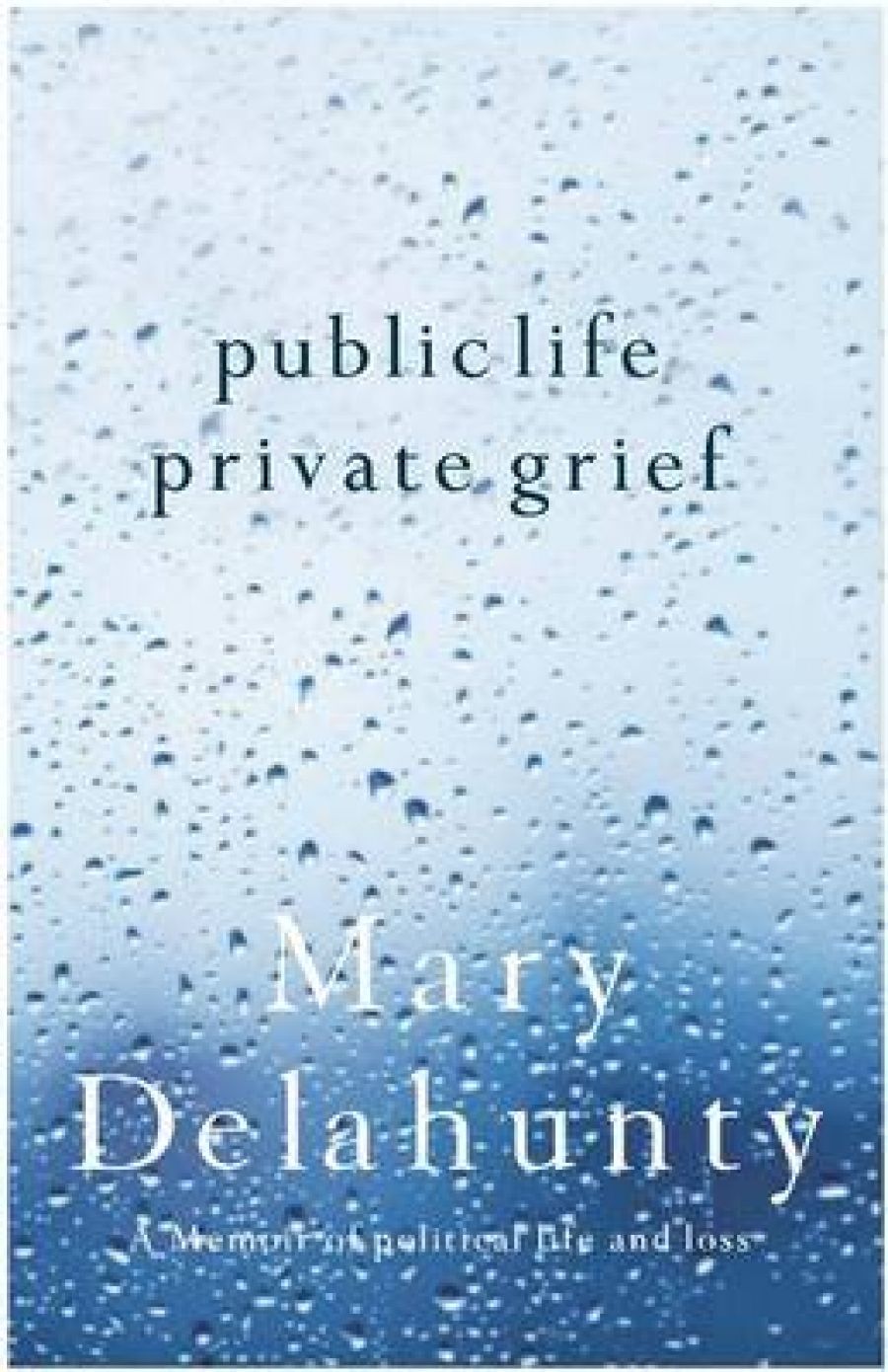
- Free Article: No
- Contents Category: Memoir
- Review Article: Yes
- Online Only: No
- Custom Highlight Text:
In August 1998 former ABC journalist Mary Delahunty won the by-election for the Victorian seat of Northcote. One year later, after Steve Bracks audaciously nabbed the premier’s crown from an unsuspecting Jeff Kennett, Delahunty found herself in charge of the education and arts portfolios. Her learning curve was steep. ‘If the chook shed was for parliamentary incubation then the dungeon provided sparse and smelly cells for the discipline of ministerial office,’ she writes in her new book, Public Life, Private Grief.
- Book 1 Title: Public Life, Private Grief: A Memoir of Political Life and Loss
- Book 1 Biblio: $29.95 pb, 240 pp, 9781740668583
- Book 1 Readings Link: booktopia.kh4ffx.net/xWkQ5
Readers looking for a narrative of Delahunty’s life – her happy childhood as one of a large brood, Loreto College schoolgirl days, university then a career in journalism, followed by the frenzied world of state politics – will be disappointed. There are a few anecdotes from Delahunty’s sparkling television and political careers, but this is a very private story. During her husband’s illness Delahunty kept a journal; one suspects that as it evolved, so did the idea of this book. As such, it is more a collection of thoughts shaped around a loose chronological structure than a traditional autobiography.
The central theme is Rankin’s death. The book opens in the parliamentary Members’ Bar on the eve of Delahunty’s resignation from politics in 2006. Memories – happy ones, sad ones – distract the retiring minister from an end- of-session get-together when ‘tired women join tired men to toast the end of weary nights, dreary speeches and some very good policy making’. She recalls her birthday drinks party in the same place, five years earlier. ‘My husband Jock was dying of cancer, although I didn’t know it then, really know it,’ she writes. ‘Two operations and the skill of the surgeon, deft with the knife, had surely excised the disease that creeps and cripples. That night I was chained to parliament in a government reliant upon every member to secure every law.’
The mood of the book is now set. Rankin’s deterioration is swift: from the charismatic, energetic reporter who boldly told his new girlfriend Mary ‘you’ll never be bored with me’, to the nervous invalid, then his last few days, surrounded by family. Even after he’s gone, Rankin’s spirit imbues every page. Public Life, Private Grief is Delahunty’s vehicle for workshopping her grief. Three things save it from the self-help book genre scrap heap. Firstly, the two protagonists were respected television journalists with a strong sense of public service, and the busyness of their daily routines gives the book pace and energy. Delahunty also brings a journalist’s analytical eye to the dramas in Parliament House. Traditions, processes and procedures such as Question Time, maiden speeches and cabinet meetings are observed and assessed. With a couple of clunky exceptions, these accounts sit well vis-à-vis her private story. One wonders, for example, about her ramble on Thomas Bent, a colourful early twentieth-century Victorian premier who, the writer imagines, ‘would have reclined comfortably on a large red velvet chaise at the Melbourne Club clutching a gin and tonic while wondering aloud to his minions how he could swat away yet another private member’s Bill on the vote for women’. As one of the few Victorian females to reach the cabinet, Delahunty has every right to muse on the role of women in parliament, but four pages on Tommy are probably four too many.
The most compelling aspect of this book is Delahunty’s determination to tackle the elephants that exist in so many widowed people’s rooms. The conversations no longer shared; the unrelenting pressure of being a solo parent, the exhaustion that accompanies even the smallest domestic decision-making; trying to be upbeat at work when you’re miserable; not crying in front of your children because they hate to see their remaining parent distressed – the writer’s anguish as she discusses these daily occurrences is palpable, and many readers will be extremely moved.
Public Life, Private Grief is the rebirth of Mary Delahunty as a public identity with a potent message. How curious that, like her great adversary Jeff Kennett, this former politician is also raising community awareness about clinical depression and offering hope to sufferers.


Comments powered by CComment